Chris Christie Enters The Race For President A Diminished Candidate With A Tough Road Ahead
Chris Christie is in the race for the Republican nomination, but it's tough to see how he has a plausible path to relevance.
As expected, New Jersey Governor Chris Christie entered the race for President today striking many of the themes that he’s been known for since 2009, but it’s unclear just how he is going to be able to overcome the many obstacles his campaign faces going forward:
LIVINGSTON, N.J. — Gov. Chris Christie declared his candidacy for president here on Tuesday in a 20-minute speech full of New Jersey-style swagger, vowing that as president, “there is one thing you will know for sure: I say what I mean and I mean what I say.”
Mr. Christie, a two-term governor, offered himself up as a teller of difficult truths, who would never shy from making the kind of painful choices required in the White House — even, he said, if “it makes you cringe every once in a while.”
“We must tell each other the truth about the problems we have and the difficulties of the solution,” he said inside a gymnasium here at the high school where he was once class president.
Taking swipes at his Republican rivals in the Senate, Mr. Christie said there would never be doubts about his ability to perform the job of president. And in an explicit attack against Hillary Rodham Clinton, Mr. Christie lamented President Obama’s foreign policy record.
“After seven years of a weak and feckless foreign policy, we better not turn it over to his second mate, Hillary Clinton,” Mr. Christie said.
But Mr. Christie, whose rapid rise as a national Republican in his first term was matched only by his spectacular loss of stature at home in his second, enters the 2016 presidential race bearing little resemblance to the candidate he once expected to be.
The economic recovery he promised has turned into a cascade of ugly credit downgrades and anemic job growth. The state pension he vowed to fix has descended into a morass of missed payments and lawsuits. The administration he pledged would be a paragon of ethics has instead conspired to mire an entire town in traffic and the governor’s office in scandal.
Just three and a half years ago, Mr. Christie seemed so popular, compelling and formidable, such an antidote to all that ailed the Republican brand, that senior figures in the party pleaded with him to run for president as a substitute for their eventual nominee, Mitt Romney.
But today, a staggering 55 percent of Republican primary voters say that they cannot envision voting for Mr. Christie, according to an NBC/Wall Street Journal Poll, a remarkable deficit from which to embark on a national campaign. The only candidate less palatable: Donald J. Trump, the bombastic developer-turned-reality television star.
With two pillars of his presidential run — his record and his judgment — looking wobblier than ever, Mr. Christie must build a campaign around his most raw and prodigious asset: his personality.
It was on vivid display on Tuesday in Livingston, where Mr. Christie, 52, the son of Sicilian-American and Irish-American parents, grew up and first tasted politics as president of his class. “Everything started here for me,” he said in announcing his run.
“Americans are not angry. Americans are filled with anxiety,” Mr. Christie said, adding: “I’m here to tell you that anxiety can be swept away by strong leadership and decisiveness to lead America again.”
Brash and big, by turns compassionate and cruel, Mr. Christie’s persona — a magnetic mix of quick-witted charm, insult-trading banter, vulnerability, empathy and effrontery — affords him, without question, his clearest advantage in a sprawling field of Republican rivals.
It comes together in a presence that Mr. Christie has sculpted, to a degree few politicians ever have, during a remarkable run of 137 town-hall-style meetings, from the working-class bungalow communities along the Jersey Shore to the wealthy suburbs of New York City. In highly ritualized, often raucous 90-minute question-and-answer sessions, he has deployed the full range of his skills, moods and whims.
Christie’s announcement comes just one week after we learned of new polling showing his job approval in the Garden State was at its lowest level of his time in office. As I said at the time, the fact that his job performance as Governor has always been his big selling point as a national politician, and was a central part of his speech today, makes this seem like an incredibly big handicap for him to overcome. After all, even when he was incredibly popular in New Jersey and nationwide just two or three years ago, it was clear that Christie was way out of step with a significant portion of the Republican Party base due to the perception that he was, and still is, perceived as being too moderate and too willing to compromise with the opposition. Add into that the fact that the one part of Christie’s resume that is his best selling point is now arguably a vulnerability, and it’s hard to see what kind path to relevance he actually he has. This point is brought home when you look at the national polling, and then in states such as Iowa, New Hampshire, South Carolina, and Florida, all of which shows Christie near the bottom of the pack. That’s hard place to start from when you’re a candidate who already has issues with the base of the party.
Nate Cohn tries to posit a path for Christie:
The long-shot candidates who matter tend to be the natural candidates of a large and often dissatisfied faction of a political party, whether as a result of their identity or their stances on the issues. Think of Rick Santorum in 2012, a natural candidate of the evangelical Protestant voters dissatisfied with Mitt Romney. Or Bernie Sanders, the socialist senator running against Hillary Clinton.
Mr. Christie’s path to relevance depends on his becoming a lot more like Mr. Sanders or Mr. Santorum than he would care to admit. He would need to become the natural candidate of the party’s relatively moderate, affluent, secular, blue-state voters
Mr. Christie is not to the blue-state Republicans as Mr. Sanders is to the progressive left, or Mr. Santorum was to evangelicals. He is not the unconditional, unabashed supporter of the views of the party’s moderate wing. If anything, Mr. Christie has spent more time pitching himself to conservatives than any other group as part of his effort to remain competitive.
But it is nonetheless easy to imagine how Mr. Christie emerges as a strong candidate for relatively moderate, metropolitan, blue-state Republicans.
ere, the historical comparison is John McCain. By any relevant measure, Mr. McCain was about as conservative as George W. Bush in 2000. In this sense, Mr. McCain was nothing like Mr. Santorum or Mr. Sanders. But Mr. McCain’s iconoclasm and Mr. Bush’s strength among Southerners and evangelicals gave Mr. McCain a strong pitch to relatively moderate, secular, Northern and independent voters.
Recent news reports suggest that Mr. Christie, deprived of the opportunity to make a broader pitch, is planning to run the sort of “straight talk” campaign that served Mr. McCain well in New Hampshire. The moderate positions that make Mr. Christie a tough sell for conservatives, like his stances on immigration and gun control, make him a relatively good fit for the state’s moderate voters: 47 percent of the electorate was moderate in 2012. In an overlapping category, an equal share in the state identified as “independent.”
Mr. Christie will face plenty of competition for relatively moderate and independent voters in New Hampshire. Mr. Bush, John Kasich, Lindsey Graham and Rand Paul all have claims to the moderate and independent vote. Mr. Rubio’s appeal could be broad enough to appeal to these voters as well, even if he is unlikely to advance a message targeted at them. But Mr. Christie’s strength as a campaigner makes it all the easier to envision how he could secure a meaningful foothold in the nation’s first primary. There is a reason, after all, that he twice won the governorship of a solidly Democratic state and was once considered a front-runner for the nomination.
Harry Enten, meanwhile, argues that whatever path Christie has to relevance, it’s going to be a tough one because of the many issues about Christie’s candidacy ranging from his own moderation compared to the rest of the GOP to Bridgegate to the fact that the GOP field is so crowded that it’s going to be hard for Christie to breakthrough. Enten’s analysis is, of course, spot on and I’ll just refer you to it rather than trying to recap it here. Suffice it to say that there is some possibility that Chris Christie could become a contender for the Republican nomination in 2016, but to get there he’s going to have to find a way to overcome all those problems. He’s also going to have to hope that he can breakthrough in New Hampshire, because if he falls short there his campaign is over. It’s not going to be easy.
Photo via NJ.com
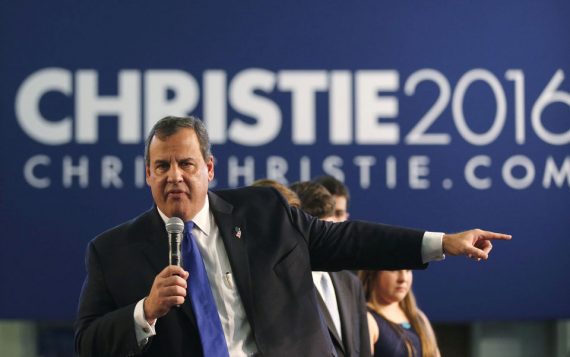

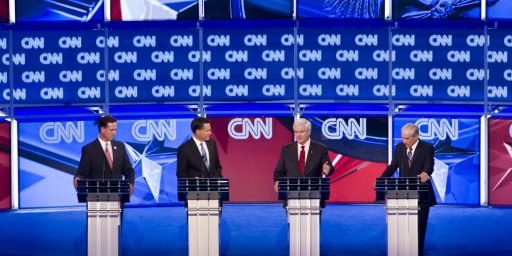
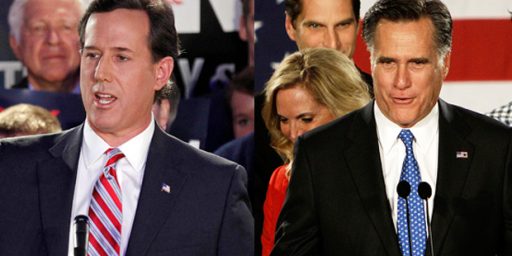
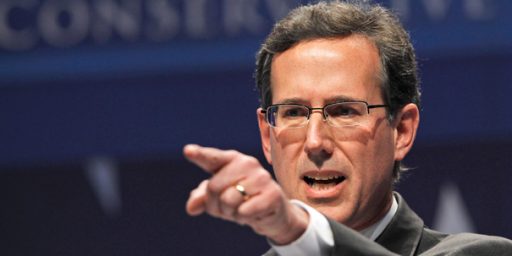
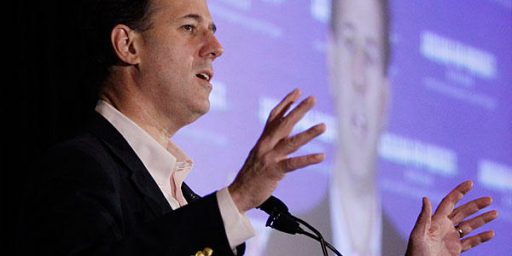
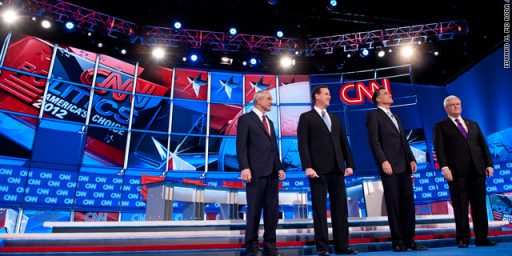
At least Doug knows the reason he’s running.
It doesn’t really matter why he’s running, Mr. Big Personality isn’t going anywhere…it’s like a Giuliani redux…
The Klown Kar claims it’s first roadkill.
If Jindal can run why not Christie? It’s not like anyone in their home states wants them to hang around.
This will be a great way to find out how many people want a fat angry a-hole as their President.
That’s part of the problem–moderates don’t usually like belligerent politicians.
Speaking of belligerence, Greece has now defaulted on its payment to the IMF. Oops.
~Stephen Sondheim
Chris Christie basically surrendered any remote chance he had of getting the Republican nomination back in 2012 with the “Hurricane Sandy hug”. Everything that’s happened since, (the bridge stuff) has only helped to erode any goodwill he may have had from those who appreciated that cooperation with the President in the aftermath of Sandy was the right thing to do. Electability was the only plausible reason Republicans might have had to nominate someone like Christie. But after two years of (fair or unfair) “bridgegate” coverage, it’s unlikely that many Democrats or even self-described moderates would even consider voting for Christie in the general anyway.
How about Bloomberg ? I haven’t heard anything from him.
“Supersize that”
@Tyrell:
Bloomberg is an Independent who leans Democratic, and isn’t running for office.
Why not run? Is he supposed to get a regular job after finishing his governorship with high unpopularity ratings? Please see the Chelsea Clinton article on this page for the rewards of running.